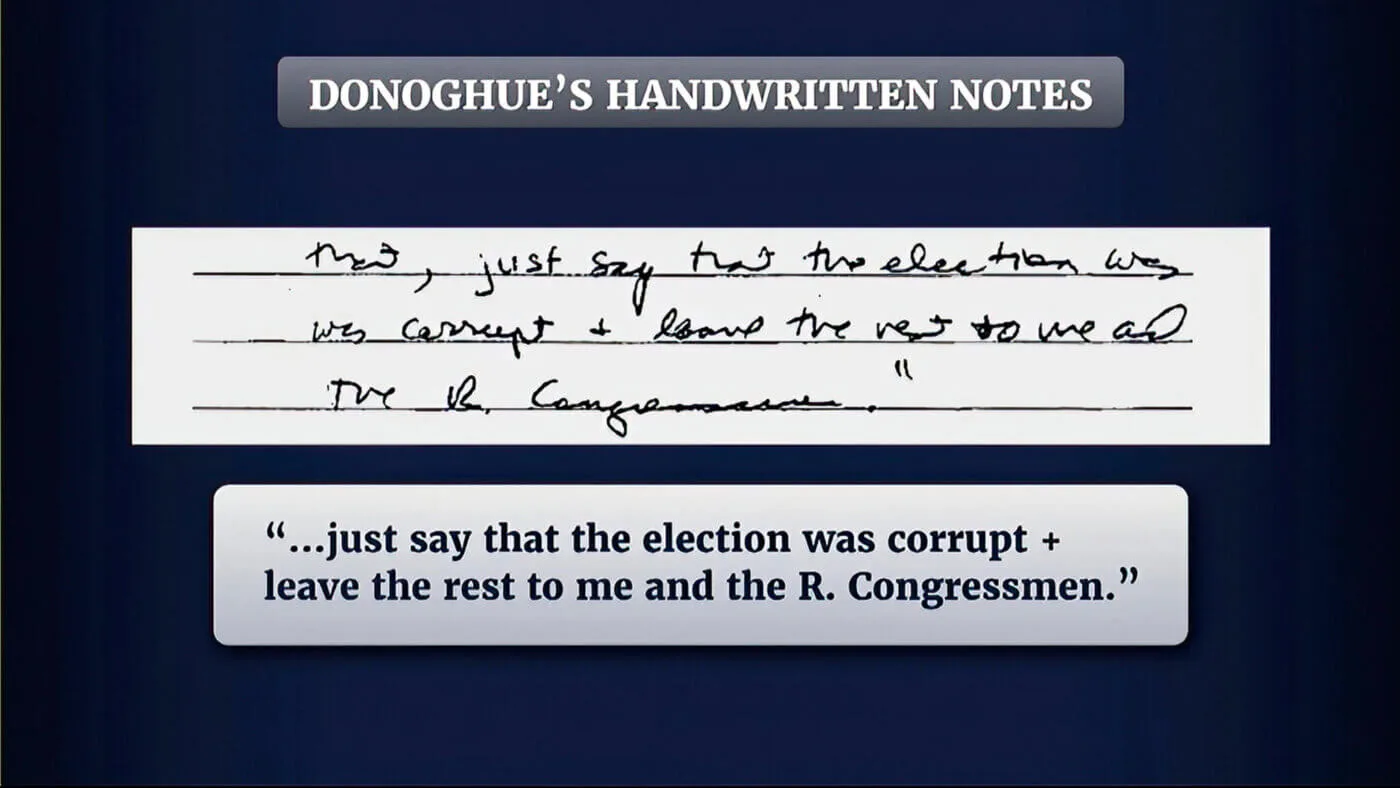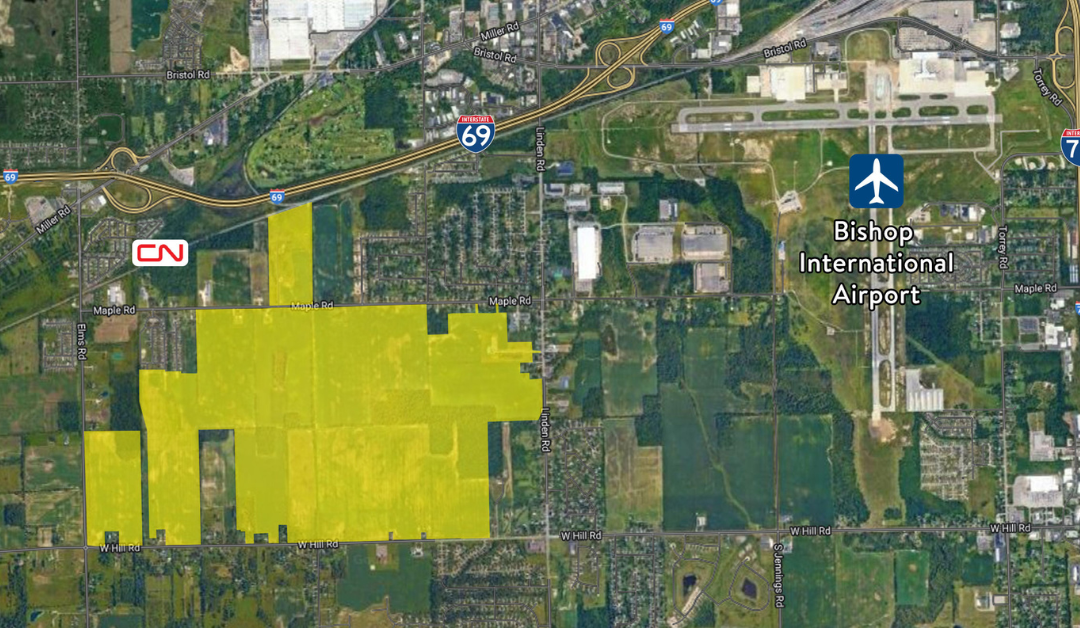
This exhibit from video released by the House Select Committee, shows handwritten notes by Richard Donoghue, former acting Deputy Attorney General, displayed at a hearing by the House select committee investigating the Jan. 6 attack on the U.S. Capitol, Thursday, June 23, 2022, on Capitol Hill in Washington. (House Select Committee via AP)
“Just say that the election was corrupt and leave the rest to me and the [Republican] congressmen,” former acting deputy attorney general Richard Donoghue recalled the former president saying during a Dec. 27, 2020, meeting.
WASHINGTON, DC—One by one, former top Department of Justice officials testified Thursday that Donald Trump did everything in his power to manipulate and misuse the agency to overturn the results of the 2020 presidential election in order to try and stay in office.
The House committee investigating the Jan. 6 attack on the US Capitol meticulously laid out the various prongs of Trump’s scheme. Following former Attorney General William Barr’s resignation in mid-December 2020, testimony and evidence showed Trump:
- tried to bully DOJ leaders to act on false claims of voter fraud.
- pressured them to seize voting machines.
- tried to convince them to file a lawsuit before the Supreme Court.
- demanded they appoint a conspiracy theorist as Special Counsel to investigate lies about election fraud.
- pushed DOJ leaders to sign off on a letter to state legislatures claiming there was election fraud and asking states to create alternative slates of electors.
- tried to install an unqualified loyalist as attorney general to do his bidding.
“Just say that the election was corrupt and leave the rest to me and the [Republican] congressmen,” former acting deputy attorney general Richard Donoghue recalled Trump saying during a Dec. 27, 2020, meeting.
Despite being told repeatedly by members of his own administration, campaign, and leaders at DOJ that there was no widespread fraud, Trump persisted. These efforts represented a catastrophic breach of ethics, would have violated the DOJ’s mission, and represented potentially criminal conduct, the committee argued.
“The president wanted the top Justice Department officials to declare that the election was corrupt, even though he knew there was no evidence of that statement,” said Republican Congressman and committee member Adam Kinzinger.
Thursday’s sobering witness testimony from Donoghue, former acting attorney general Jeffrey Rosen, and former assistant attorney general for the Office of Legal Counsel Steven A. Engel clarified just how close the United States came to a constitutional crisis in the days preceding the Jan. 6 insurrection at the Capitol.
“For the department to insert itself into the political process this way, I think would have had grave consequences for the country,” Donoghue said. “It may very well have spiraled us into a constitutional crisis.”
Here are three other takeaways from Thursday’s hearing.
Several Republicans in Congress Asked the White House for Pardons
According to former Trump White House aides Cassidy Hutchinson and Johnny McEntee, Reps. Scott Perry of Pennsylvania, Andy Biggs of Arizona, Matt Gaetz of Florida, Marjorie Taylor Greene of Georgia, and Louie Gohmert of Texas all asked for pardons.
Additionally, Rep. Mo Brooks of Alabama sent an email on Jan. 11, 2021, asking for “all purpose” pardons for every lawmaker who objected to electoral votes from Arizona and Pennsylvania, a list that includes nearly 150 Republican lawmakers.
Perry, who represents the 10th district in Pennsylvania, has previously denied asking for a pardon. Given their track records of betraying their oath to the Constitution, it’s unlikely that these lawmakers will admit to their actions. Kinzinger, their fellow Republican, made clear that there’s only one reason you’d ask for a pardon: “Because you think you’ve committed a crime,” he said Thursday.
Trump’s Reckless Schemes Centered Around an Unqualified DOJ Official
Much of Thursday’s hearing focused on Jeffrey Clark, the former Assistant Attorney General for the Environment and Natural Resources Division of the DOJ, who was also appointed acting head of the department’s Civil Division in 2020.
Rosen, Donoghue, and Engel testified how Clark—whose home was searched by federal officials on Wednesday—emerged from relative obscurity to amplify Trump’s election lies and scheme alongside the former president.

Clark, who was introduced to Trump by Perry just before Christmas, embraced the former president’s lies of voter fraud. He authored a Dec. 28 letter that was meant for leaders of Georgia’s state government, claiming falsely that there was widespread election fraud there. The unsent letter said that the DOJ wanted Georgia state lawmakers to meet and appoint a new slate of electors in order to hand the presidency to Trump.
Clark shared the letter with Rosen and Donoghue, both of whom refused to sign it and effectively warned him to cut it out. White House lawyer Eric Herschmann derided the proposal as “nuts” and fellow White House attorney Pat Cipollone similarly rejected it as a “murder-suicide pact.”
But over the coming days, Clark continued to backchannel with the White House, and Perry pushed for Clark to be appointed attorney general. At the same time, Trump continued to pressure Rosen to do more to investigate election fraud, even as Rosen and Donoghue told him repeatedly that there had been no evidence of widespread fraud.
“There were isolated instances of fraud. None of them came close to calling into question the outcome of the election in any individual state,” Donoghue testified before the committee.
As January rolled around and Donoghue and Rosen continued to rebuff Trump’s efforts to use the DOJ for his own gain, the former president appeared ready to name Clark as his new attorney general.
“He repeatedly said to the president that, if he was put in the seat, he would conduct real investigations that would, in his view, uncover widespread fraud,” Donoghue said of Clark. “He would send out the letter that he had drafted; and that this was a last opportunity to sort of set things straight with this defective election, and that he could do it, and he had the intelligence and the will and the desire to pursue these matters in the way that the president thought most appropriate.”
Donoghue derided Clark as incompetent and unqualifed to address any issues relating to elections.
“How about you go back to your office and we’ll call you when there’s an oil spill,” Donoghue recalled saying to the environmental lawyer.
As Rosen became aware that Trump was going to replace him with Clark, he called for a meeting at the White House on Jan. 3, which included the president, his chief of staff Mark Meadows, Cipollone, Herschmann, and Donoghue.
Prior to that meeting, Rosen and Donoghue held a call with their assistant attorneys general, virtually all of whom said they’d resign en masse if Trump installed Clark as the department’s leader. Trump was prepared to do just that—White House logs from the afternoon of Jan. 3 even show that Clark was referred to as “Acting Attorney General”—but during that evening meeting, attendees convinced Trump that it would have massive consequences.
Rosen and Donoghue argued that it could lead to a cascade of resignations from the top all the way down through the lower rungs of the DOJ.
“The leadership would be gone, Jeff Clark would be left leading a graveyard,” Donoghue recounted.
Conspiracy Theories Ran Rampant in Trump’s White House
The public also learned Thursday about several different conspiracy theories that Trump and his allies embraced in order to help the president stay in office.
“You guys may not be following the internet the way I do,” Trump told DOJ officials when informed the conspiracies were not true.
Perry asked Meadows to investigate the most outlandish conspiracy, which centered around the bizarre idea that Italian satellites changed votes for Trump to Joe Biden. Meadows then shared a video link highlighting the theory with Rosen, who watched it and dismissed it outright.
Donoghue similarly labeled the conspiracy theory as “patently absurd” and “pure insanity.” But that didn’t stop Team Trump from involving Defense Department leaders and asking them to investigate—which they did.
Despite the bizarre nature of these ideas, as Thursday’s hearing showed, Trump’s embrace of debunked conspiracy theories and historically dangerous attempts to manipulate the levers of the federal government to stay in power came awfully close to paying off.
“He was willing to sacrifice our Republic to prolong his presidency,” Kinzinger said. “I can imagine no more dishonorable act by a president.”
The next Jan. 6 House committee hearing is expected to take place in July.
Politics

Michigan lawmakers look to break (another) state funding record for public schools
Democratic lawmakers are hashing out plans to bring state funding for Michigan’s public schools to another new, all-time high—and ensure teachers...

Mundy Twp. project gets state funding in effort to boost local manufacturing
More than $9 million awarded to a planned development project in Genesee County could provide a big boost to the local economy and help create...

It’s official: Your boss has to give you time off to recover from childbirth or get an abortion
Originally published by The 19th In what could be a groundbreaking shift in American workplaces, most employees across the country will now have...
Local News

More Michigan teens could soon take driver’s ed in their own schools
Privatization of driver’s education means that only 38 Michigan high schools offer affordable in-school driving classes for students. New grants...

That one time in Michigan: When we became the Wolverine State
How did Michigan become tied to an animal that's practically nonexistent there? Among the many nicknames that the state of Michigan has, arguably...





